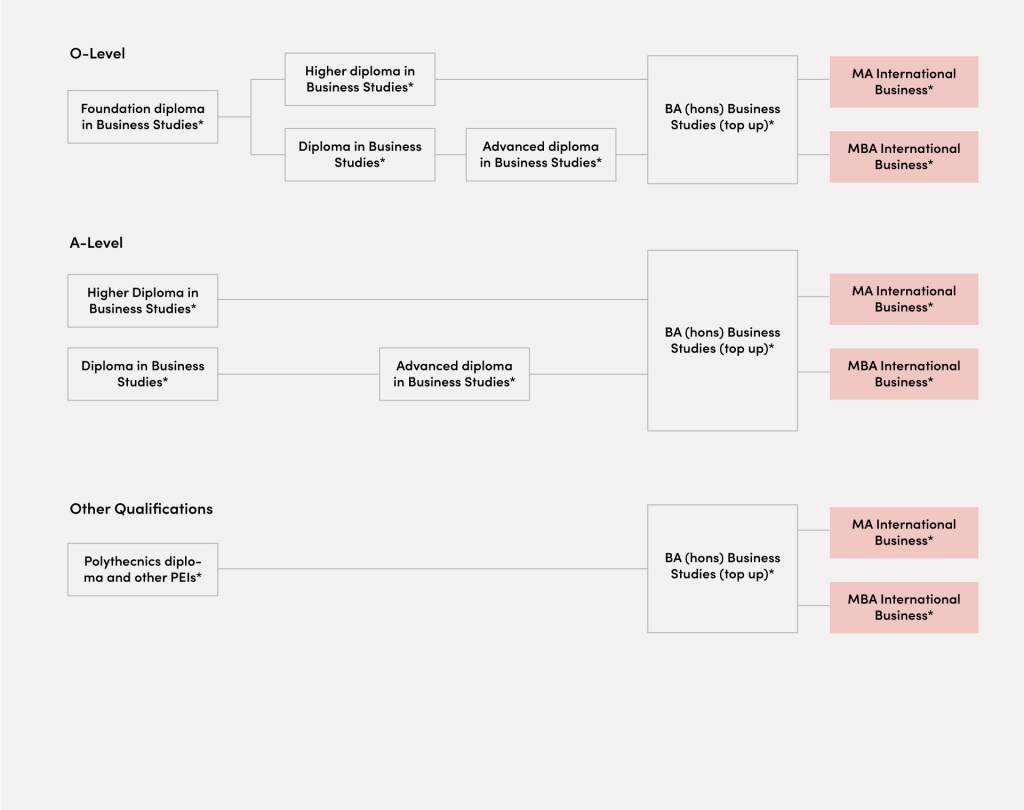
OVERVIEW
About This Programme

The Master of Arts in International Business equips students with the knowledge and skills to navigate the complexities of global business environments. The programme covers critical areas such as global strategy, international entrepreneurship, sustainability, and cross-cultural management, preparing graduates for leadership roles in international business.
With a strong emphasis on both theoretical frameworks and practical applications, students gain a comprehensive understanding of international markets, global trade, and organisational strategies. The programme culminates in a substantial research project, allowing students to explore real-world business issues in depth. Upon completion, the MA degree will be awarded by the University of Greenwich.
Ranked Top 7% Globally by Center for World University Rankings
Research Excellence Framework strong research quality across all subject areas
Guided career sessions
MODULES
Designed to explore beyond subject knowledge
The Master of Arts in International Business offers a robust curriculum designed to provide students with both theoretical insights and practical skills. Core modules such as Global Strategy: Analysis & Practice, Managing Across Cultures, and International Entrepreneurship focus on developing strategic and leadership capabilities for international markets.
Graduates will gain expertise in International Business Finance, Global Business & Sustainability, and research methodologies through modules like Foundations of Scholarship & Research. The programme culminates with the International Business Project, enabling students to apply their knowledge to a real-world business issue, further enhancing their global business acumen.
Financial & Management Accounting
This module introduces non-specialists to key accounting and finance concepts, enabling them to critically evaluate company performance using publicly available information. It also explores internal systems and resources essential for achieving strategic goals.
The module provides students with tools to analyse external data for assessing performance and demonstrates how internal data can be utilised to drive organisational success. This dual approach equips students with a comprehensive understanding of accounting’s role in strategic decision-making.
Global Strategy: Analysis & Practice
This module equips students with analytical tools to evaluate how firms achieve strategic success relative to their objectives. It fosters management competencies that add value to organisations and provides knowledge of strategy formulation tools.
Students will develop analytical skills to select strategic directions from various options and engage critically with strategy implementation. The module also enables students to analyse organisational structures and cultures, assessing their alignment with strategic goals.
International Economics & Innovation
This module analyses the interaction between entrepreneurial initiatives, innovation networks, and macro-level innovation policies in shaping economic competitiveness and development trajectories within the global economy.
Students will engage in a comparative analysis of country-specific innovation systems, exploring how institutional and cultural differences influence the business environments that drive innovation and technological change at the firm level.
Managing Across Cultures
This module explores the challenges of leading, managing, and developing people in cross-cultural contexts. It examines theoretical frameworks and models addressing motivation, communication, negotiation, leadership, multicultural teamwork, and diversity at individual, group, and organisational levels.
Students will engage in weekly reflections and analyse empirical research to develop practical skills and competencies for effectively managing and leading across cultures and borders.
International Business Finance
The aim of this module is to equip students with a Financial Management toolkit, to engage in Business Finance matters which postgraduates in International Business should be able to address. The goal is to analyse how small, medium and large firms finance their economic activities in the global economy. The Learning Outcomes addressed are considered central to managerial jobs in a 21st century fast changing economy.
Foundations of Scholarship & Research
This module equips students with essential skills to succeed in master’s-level study and professional life. It provides knowledge and understanding of research design and the practical application of business research methods, preparing students for academic and professional research challenges.
International Entrepreneurship
This module examines the impact of international business operations on entrepreneurial firms, highlighting strategies for entrepreneurs to conduct business in foreign markets. Students will gain insights into the challenges and opportunities of international entrepreneurship, equipping them to navigate global business environments effectively.
Global Business & Sustainability
This module provides an understanding of the key factors influencing international business decisions and explores the similarities and differences within the global business environment.
Students will examine the imperatives underpinning international trade and foreign direct investment, as well as the principles of the internationalisation process, drawing insights for effective business management in a sustainable global context.
International Business Project
This module enables students to undertake a substantial piece of independent research, culminating in a professionally structured and argued document of approximately 10,000 words.
Students will apply theoretical perspectives to address real-world economic, business, or policy questions, gaining in-depth knowledge of relevant literature and developing expertise in identifying and using appropriate data and evidence. The module fosters critical thinking and analytical skills, guiding students through the research process to produce logical conclusions and, where applicable, actionable recommendations.
Full programme structure and learning outcomes
Get details and learn about the advantages of learning with LSBF.
what to expect
Advance Your Career in Business
Programme Aims
- Provide students, including those without an undergraduate business background, with the knowledge and skillsneeded to operate in a global business environment.
- Facilitate the advanced study of international business organisations, their management, and external context.
- Enable students to analyse, critique, and apply knowledge to complex international business issues.
- Equip students to master, apply, and evaluate research methodologies, techniques, and tools relevant to employers’ needs.
- Enhance lifelong learning skills and personal development, fostering self-direction and originality in work.
- Prepare students for a career in international business across various organisational functions and industries.
Summary of Skills Development for Students within the Programme
- Understand and have experience with global issues affecting businesses.
- Develop critical analytical skills to assess the global business environment.
- Deal with complex issues systematically and creatively, make sound judgments in incomplete data scenarios, and communicate conclusions clearly to diverse audiences.
- Make decisions in complex and unpredictable situations and operate effectively in team roles, including leadership positions.
- Take responsibility for their continuous personal and professional development.
- Identify new international business opportunities and analyse global markets and industries.
- Contribute to organisational transformation through leadership, intellectual rigour, and professional ethical values.
- Plan and implement projects with autonomy and professionalism.
- Demonstrate well-developed interpersonal skills, including effective communication, negotiation, and interaction across various organisational levels.
Learning Outcomes
Knowledge and Understanding
- Understand organisations competing internationally, their external context, and management approaches.
- Comprehend international business strategy, innovation, the internationalisation process, and the complexities of global competition.
- Develop expertise in research approaches, methodologies, and scholarship skills for academic and organisational application.
- Gain insights into advanced leadership concepts and collaborative problem-solving through professional development and reflective practice.
Intellectual Skills
- Critically evaluate the complexity of international management and analyse incomplete or contradictory knowledge.
- Understand the theoretical, philosophical, and methodological underpinnings of academic research.
- Analyse, synthesise, and solve complex, unstructured business problems.
- Collaborate with peers to clarify professional values and practical concerns.
Subject Practical Skills
- Apply research, methodological, and scholarship skills in academic and business contexts.
- Communicate effectively in an international business environment.
- Analyse business environments and evaluate organisational capabilities effectively.
- Develop strategic operations, marketing, and international scenarios aligned with current corporate strategies.
Transferable Skills
- Manage complex and conflicting information, theories, methodologies, and data effectively.
- Exhibit strong communication, leadership, negotiating, and influencing skills.
- Use reflective skills to critically assess the efficiency and effectiveness of current knowledge for practical application.
Skills you will acquire

$92,000+
median Singapore salary for Accounting
483,000+
Singapore job openings in Accounting
75%
of graduates report positive career outcome
programme structure
Attendance requirements
International Students: 90%
Local, PR, non-student pass: 75%
Progression path with LSBF in Singapore

Teacher student ratio
1:300
STUDENT SUPPORT SERVICES
Why choose LSBF for your education
Study Materials
Students will receive study materials after they have made full payment for their programme. Replacement of study materials is subject to additional charge.
Student Portal
Students have access to the Student Portal. It is a useful site where the course information and learning materials are available for students’ easy reference.
Accessible Faculty
Students may contact their lecturers directly via email outside the lecture hours for any academic related queries.
Recorded Lectures
We will show compassion and care to all stakeholders as we believe the journey is as important as the outcome.
ELIGIBILITY
Who can apply for this programme
Minimum Academic Entry Requirement:
Students who have successfully completed either of the following:
- Bachelor’s degree from a recognised University with minimum 2 classifications
- Students, who have obtained equivalent qualifications in relevant fields (usually professional qualification), will be assessed case-by-case and subjected to university approval
Minimum English Language Entry Requirement
- Applicants who have not studied prior qualifications in English require IELTS 6.0 or equivalent in an accepted English language test.
Minimum Age
- 21 years or above
TUTION FEES
(Prices inclusive of GST)
SGD $18,203.00
(local students)
SGD $21,800.00
(international students)
FAQs
What career opportunities are available after this degree?
You’ll be equipped for roles such as international business consultant, regional operations manager, trade analyst, or global marketing executive.
What can I study after this degree?
You may pursue professional development in areas like supply chain, entrepreneurship, or digital transformation through short courses or microcredentials.
What if I want to pivot away from international business?
That’s okay. Your cross-cultural understanding and strategic thinking are applicable in general management, marketing, or consultancy roles.
How do I get started?
Reach out to our expert education consultants at +65 6580 7700 or visit us at 80 Robinson Road, #01-00, Singapore 068898. We’re here to help you plan your next step.




















